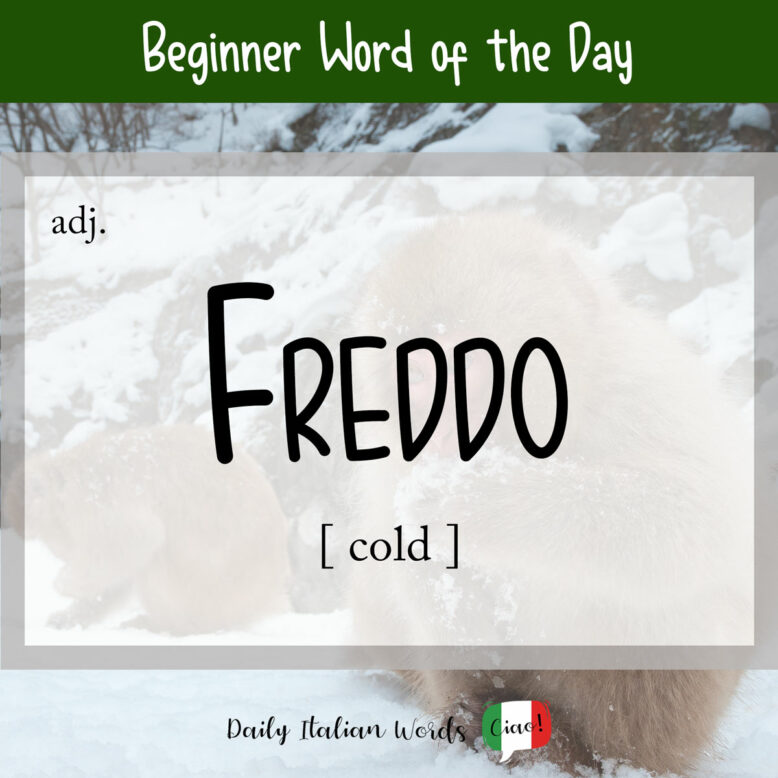One of the very first Italian adjectives you should learn as a beginner is freddo, which means cold.

‘Freddo’ as an adjective
As with all adjectives, the ending changes in accordance with the gender and/or number of the subject in question.
- freddo = masculine, singular
- fredda = feminine, singular
- freddi = masculine, plural
- fredde = feminine, plural
Much like the English word cold, you can use freddo to describe anything characterised by a low temperature. Below are a few common examples.
Weather
- un vento freddo = a cold wind
- una giornata fredda = a cold day
- un inverno freddo = a cold winter
Food
- una bevanda fredda = a cold drink
- un piatto freddo = a cold dish
- una cena fredda = a cold dinner
Body parts
- le mani fredde = cold hands
- i piedi freddi = cold feet*
- le dita fredde = cold fingers
*Note: to have / to get cold feet is a popular English expression that means to lose courage or to have strong doubts about something (to the point of abandoning it). However, you can’t translate this literally into Italian. The easiest way to express the same idea is avere paura (to be afraid), tirarsi indietro (to back down, to quit) or avere dei ripensamenti (to have second thoughts).
Domani sarà una giornata molto fredda. La temperatura scenderà sotto lo zero!
Tomorrow will be a very cold day. The temperature will go below zero.

Being such a commonplace adjective, it will come as no surprise that there are a couple of figurative meanings attached to freddo.
One that should be easy to recall for English speakers is detached, indifferent or uninterested, since the word cold has the same figurative meaning.
Una persona fredda raramente mostra le sue emozioni.
A cold person rarely shows his / her emotions.

The other figurative meaning, which may prove more challenging to remember, is level-headed, calm or collected. For example, ragionare a mente fredda (lit. to reason with a cold mind) means you are able to clearly focus without being influenced by emotions.
Non posso darvi una risposta adesso. Devo ragionare a mente fredda.
I can’t give you an answer now. I need to think clearly.
Un animale a sangue freddo is a cold-blooded animal. Interestingly, a sangue freddo also means “in cold blood“, as in the act of doing something without feeling or mercy.
Sangue freddo can also refer to a person who is very calm and unperturbed by what is happening around him or her. This is where we get the expression Calma e sangue freddo! which can be said to calm a person down. Singer Luca Dirisio even wrote a song with this expression in the title.
Ragazzi, calma e sangue freddo! Spiegatemi per bene cosa è successo.
Guys, calm down! Tell me exactly what happened.
Another interesting expression is doccia fredda (lit. cold shower) which means an unexpected disappointment.

‘Freddo’ as a noun
Another characteristic the word freddo shares with its English equivalent is that it can also be used as a noun. For example, il freddo dell’inverno translates as the winter cold. In this sense, it commonly appears in the company of the following verbs:
- avere freddo = to be cold (lit. to have cold) – used to describe how a person feels (e.g. Ho freddo! = I’m cold!)
- fare freddo = to be cold (lit. to do cold) – used to describe the state of the weather (e.g. Fa freddo oggi! = It’s cold today!)
- sentire freddo = to feel cold
- soffrire il freddo = to suffer from the cold
- patire il freddo = to suffer from the cold
Fa troppo freddo fuori! Ho già abbastanza freddo qui in casa, figurati se esco!
It’s too cold outside! I’m cold enough as it is here in the house, so there’s no way I’m going out!

Sometimes you may see freddo used in the plural, particularly in the expression i primi freddi (lit. the first colds) which refers to the first cold spells of the season.
A possible figurative meaning for freddo as a noun is “a sense of horror or fear”.
Mi viene freddo solo a pensarci!
It gives me the shivers just thinking about it!
The expression a freddo literally means to prepare something without the use of fire or heat, but it is also used figuratively to describe calculated actions unclouded by emotion (e.g. decidere a freddo = to make a level-headed decision).
To wrap things up, let’s take a look at a few useful words that derive from freddo:
- freddoloso = sensitive to the cold
- freddezza = indifference, cold-heartedness, detachment
- freddura = pun, quip, play on words
- freddare = to cool, to chill, to gun down
- freddarsi = to go cold
- freddamente = coldly, coolly, in an unfriendly way
Idioms featuring the word ‘freddo’
Fa un freddo cane!
Literal translation: It makes a cold dog. / It’s dog cold.
English meaning: It’s freezing cold.
Fa un freddo boia!
Literal translation: It makes a cold hangman. / It’s hangman cold.
English meaning: It’s freezing cold.
Non mi fa né caldo né freddo
Literal translation: It makes me neither hot nor cold.
English meaning: I’m indifferent.
Sudare freddo
Literal translation: to sweat cold
English meaning: to be in a cold sweat
Heather Broster is a graduate with honours in linguistics from the University of Western Ontario. She is an aspiring polyglot, proficient in English and Italian, as well as Japanese, Welsh, and French to varying degrees of fluency. Originally from Toronto, Heather has resided in various countries, notably Italy for a period of six years. Her primary focus lies in the fields of language acquisition, education, and bilingual instruction.


